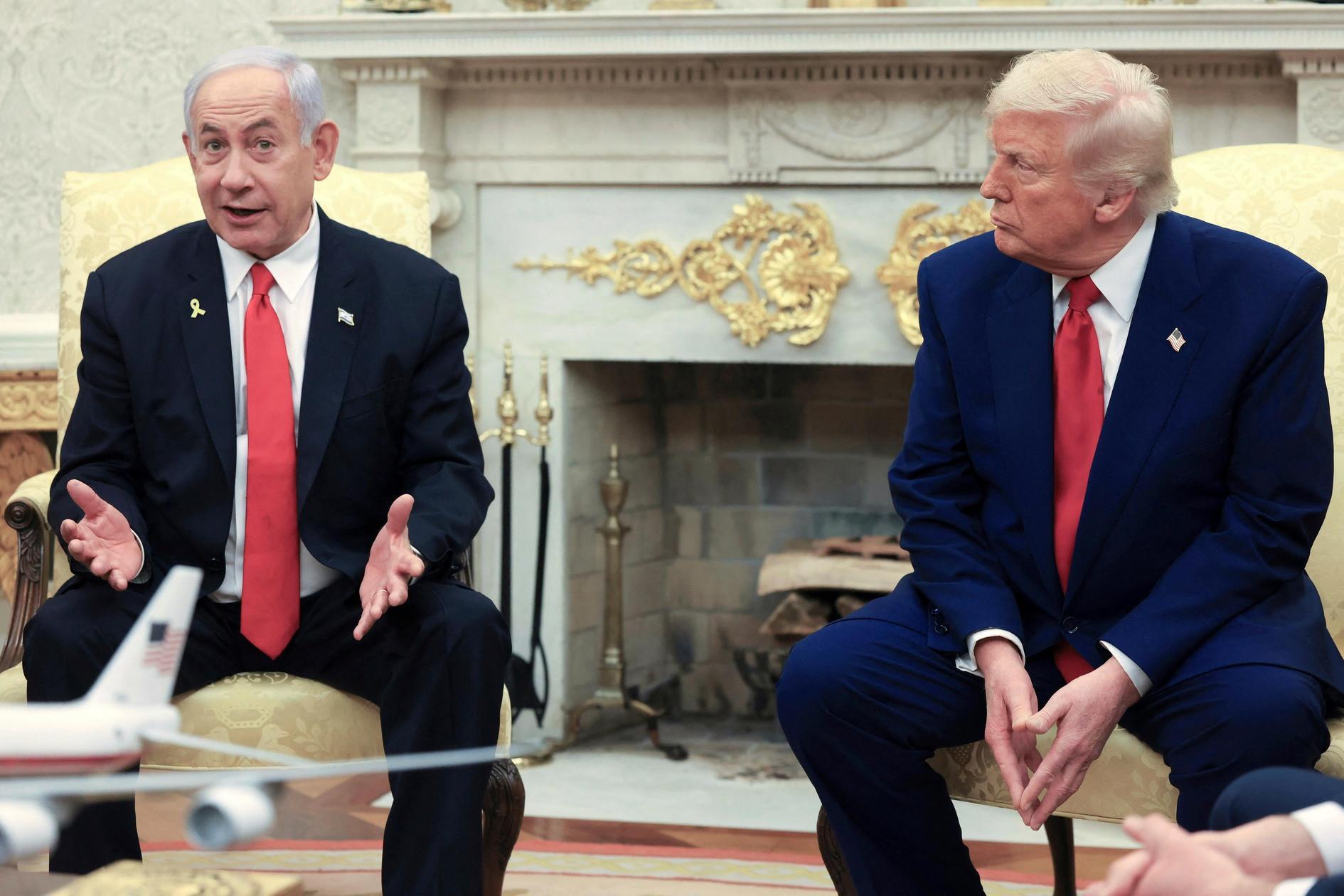
President Donald Trump, right, listens as Israel's Prime Minister Benjamin Netanyahu speaks during a meeting in the Oval Office at the White House in Washington, April 7, 2025.
Israeli Prime Minister Benjamin Netanyahu said Monday that the release of a U.S.-Israeli hostage announced by Hamas would not lead to a ceasefire in the Gaza Strip or the release of Palestinian prisoners.
Negotiations for a possible deal to secure the release of all hostages in Gaza would continue "under fire, during preparations for an intensification of the fighting", Netanyahu said in a statement released by his office.
Hamas on Sunday said it would release Edan Alexander, a U.S.-Israeli soldier held in Gaza, as the group revealed it was engaged in direct talks with the United States towards a ceasefire in the war-battered territory.
Hamas also expressed gratitude to Türkiye, alongside Qatar and Egypt, for their mediation efforts in facilitating the process.
No date was given, but the family of 21-year-old Alexander said they had been informed that he might be released "in the coming days".
"Israel has not committed to a ceasefire of any kind or the release of terrorists but only to a safe corridor that will allow for the release of Edan," Netanyahu said.
The promise of Alexander's release had been achieved through "military pressure" in the Gaza Strip, Netanyahu said.
"We are in the midst of critical days in which Hamas has been presented with a deal that would enable the release of our hostages," he added.
Earlier, two Hamas officials told AFP that talks were ongoing in the Qatari capital of Doha with the United States and reported "progress" had been made.
Israeli strikes, meanwhile, continued, with Gaza's civil defense agency reporting that at least 10 people were killed in an overnight Israeli airstrike on a school housing displaced people.
"At least 10 (dead), including several women and children, as well as dozens of wounded, were transported following an Israeli airstrike on the Fatima Bint Asad school, which is home to more than 2,000 displaced people in the city of Jabalia," Civil Defense spokesman Mahmud Bassal told AFP.
The announcement of the first hostage release since Israel shattered a ceasefire in March comes shortly before Trump visits the Middle East this week. It highlighted the willingness of Israel's closest ally to inject momentum into ceasefire talks for the 19-month war as desperation grows among hostages' families and Gaza's over 2 million people under the new Israeli blockade.
"This was a step taken in good faith towards the United States and the efforts of the mediators — Qatar and Egypt — to put an end to this very brutal war and return ALL living hostages and remains to their loved ones," Trump said on his social media platform Truth Social on Sunday evening. “Hopefully this is the first of those final steps necessary to end this brutal conflict. I look very much forward to that day of celebration!”
Netanyahu’s government was angered by U.S. direct talks with Hamas earlier this year — which led to a Hamas offer to release Alexander and the bodies of four other hostages if Israel recommitted to a stalled ceasefire deal. Days later, however, Israel resumed the war.
Khalil al-Hayyah, a Hamas leader in Gaza, said the group has been in contact with the U.S. administration over the past few days.
Al-Hayyah said in a statement Hamas is ready to “immediately start intensive negotiations” to reach a final deal for a long-term truce, which includes an end to the war, the exchange of Palestinian prisoners and hostages in Gaza and the handing over of power in Gaza to an independent body of technocrats.
Indirect talks between Hamas and the U.S. began five days ago, an Egyptian official and a senior Hamas official told the AP, with both describing the release of Alexander as a gesture of goodwill.
The senior Hamas official, speaking on condition of anonymity because he was not authorized to speak to the media, said Alexander is expected to be released on Monday. Hamas was advised to “give a gift to President Trump and in return he will give back a better one,” the official said.
Another Hamas official, speaking on condition of anonymity to discuss negotiations, said Alexander’s release is expected in the next 48 hours, adding that it requires Israel to pause fighting for a couple of hours.
The Egyptian official involved in ceasefire negotiations, speaking on condition of anonymity to discuss talks, said Hamas received assurances from the Trump administration through Egyptian and Qatari mediators that Alexander’s release “will put all files on the negotiating table” including an end to the war.
Israeli strikes overnight and into Sunday also killed 15 people in Gaza, mostly women and children, according to local health officials.
Two strikes hit tents in the southern city of Khan Younis, each killing two children and their parents, according to Nasser Hospital, which received the bodies. Another seven people were killed in strikes elsewhere, including a man and his child in a Gaza City neighborhood, according to hospitals and Gaza's Health Ministry.
The Israeli military says it only targets militants and tries to avoid harming civilians. It blames Hamas for civilian deaths in the 19-month-old war because the militants are embedded in densely populated areas.
Israel has sealed Gaza off from all imports , including food, medicine and emergency shelter, for over 10 weeks in what it says is a pressure tactic aimed at forcing Hamas to release hostages. Israel in March shattered the ceasefire that had facilitated the release of more than 30 hostages.
Aid groups say the humanitarian crisis is worse than at any time in the war, with food running low.